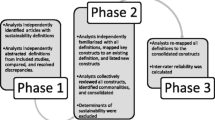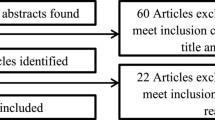Abstract
The research presented here reports on sustainability of the practices within the National Implementing Evidence Based Practices Project for people with serious mental illness. Forty-nine sites completed the initial 2-year implementation phase and were the focus of our study. Our aims were to discern the number of sites that sustained practices 2 years after implementation, the reasons for sustaining or not sustaining, differences in characteristics between the two groups, and the extent and nature of practice adaptations. We used a mixed-methods approach, based on a telephone survey that gathered qualitative and quantitative data from site representatives and others familiar with the sites and practices during the follow-up period. We found that 80% of sites sustained their practices for 2 years post-implementation, that sustainers differed from non-sustainers in several domains: financing, training, fidelity and agency leadership, and that most sites adapted practices moderately to meet state and local needs.
Similar content being viewed by others
References
Battistich, V., Schaps, E., Watson, M., & Solomon, D. (1996). Prevention effects of the child development project: Early findings from an ongoing multisite demonstration trial. Journal of Adolescent Research, 11(1), 12–35. doi:10.1177/0743554896111003.
Blasinski, M., Goldman, H. H., & Unutzer, J. (2006). Project IMPACT: A report on barriers and facilitators to sustainability. Administration and Policy in Mental Health and Mental Health Services Research, 33, 718–729. doi:10.1007/s10488-006-0086-7.
Bond, G. R., McHugo, G. J., Becker, D. R., Rapp, C. A., & Whitley, R. (2008). Fidelity of supported employment: Lessons learned from the national evidence-based practice project. Psychiatric Rehabilitation Journal, 31(4), 300–305. doi:10.2975/31.4.2008.300.305.
Botvin, G. J., Baker, E., Dusenbury, L., Botvin, E. M., & Diaz, T. (1995). Long-term follow-up results of a randomized drug abuse prevention trial in a white middle-class population. Journal of the American Medical Association, 273(14), 1106–1112. doi:10.1001/jama.273.14.1106.
Botvin, G. J., Griffin, K. W., Diaz, T., & Ifill-Williams, M. (2001). Drug abuse prevention among minority adolescents: Posttest and one-year follow-up of a school-based preventive intervention. Prevention Science, 2(1), 1–13. doi:10.1023/A:1010025311161.
Brunette, M., Asher, D., Whitley, R., Lutz, W. J., Wieder, B. L., Jones, A. M., et al. (2008). Implementation of integrated dual disorder treatment: A qualitative analysis of facilitators and barriers. Psychiatric Services, 59(9), 989–995. doi:10.1176/appi.ps.59.9.989.
Carpinello, S. E., Rosenberg, L., Stone, J., Schwager, M., & Felton, C. J. (2002). New York State’s campaign to implement evidence-based practices for people with serious mental disorders. Psychiatric Services, 53(2), 153–155. doi:10.1176/appi.ps.53.2.153.
Dixon, L., McFarlane, W. R., Lefley, H., Lucksted, A., Cohen, M., Falloon, I., et al. (2001). Evidence-based practices for services to families of people with psychiatric disabilities. Psychiatric Services, 52(7), 903–910. doi:10.1176/appi.ps.52.7.903.
Drake, R. E., Becker, D. R., Goldman, H. H., & Martinez, R. A. (2006). The Johnson & Johnson-Dartmouth community mental health program: Disseminating evidence-based practice. Psychiatric Services, 57(3), 302–304. doi:10.1176/appi.ps.57.3.302.
Drake, R. E., Goldman, H. H., Leff, H. S., Lehman, F., Dixon, L., Mueser, K., et al. (2001). Implementing evidence-based practices in routine mental health service settings. Psychiatric Services, 52(1), 179–182. doi:10.1176/appi.ps.52.2.179.
Drake, R. E., Merrens, M. R., & Lynde, D. W. (Eds.). (2005). Evidenced-based mental health practice: A textbook (1st ed.). New York: W.W. Norton & Company.
Elliot, D. S., & Mihalic, S. (2004). Issues in disseminating and replicating effective prevention programs. Prevention Science, 5(1), 47–53. doi:10.1023/B:PREV.0000013981.28071.52.
Goldman, H. H., Ganju, V., Drake, R. E., Gorman, P., Hogan, M., Hyde, P. S., et al. (2001). Policy implications for implementing evidence-based practices. Psychiatric Services, 52(12), 1591–1597. doi:10.1176/appi.ps.52.12.1591.
Gottfredson, D. C., & Koper, C. S. (1996). Race and sex differences in the prediction of drug use. Journal of Consulting and Clinical Psychology, 66(2), 305–313. doi:10.1037/0022-006X.64.2.305.
Greenhalgh, T., Glenn, R., McFarlane, F., Bate, P., & Kyriakidou, O. (2004). Diffusion of innovations in service organizations, systematic review and recommendations. The Milbank Quarterly, 82(4), 581–629. doi:10.1111/j.0887-378X.2004.00325.x.
Institute of Medicine of the National Academies (2005). Improving the quality of health care for mental and substance use conditions: Quality chasm series. Retrieved from http://www.iom.edu/CMS/3809/19405.30836.aspx.
Isett, K. R., Burnman, M. A., Coleman-Beattie, B., Hyde, P. S., Morrissey, J. P., Magnabosco, J., et al. (2007). Implementation issues for evidence-based practices: The state policy context. Psychiatric Services, 58(7), 914–921. doi:10.1176/appi.ps.58.7.914.
Jerrel, J. M., & Ridgely, M. S. (1999). Impact of robustness of program implementation on outcomes of clients in dual diagnosis programs. Psychiatric Services, 50(1), 109–112.
Levine, S., Unutzer, J., Yip, J., Hoffing, M., Leung, M., Fan, M., et al. (2005). Physician satisfaction with a collaborative disease management program for treating late life depression in primary care. General Hospital Psychiatry, 27, 383–391. doi:10.1016/j.genhosppsych.2005.06.001.
Magnabosco, J. L. (2006). Innovations in mental health services implementation, a report on state-level data from the US evidence-based practices project. Implementation Science, 1(13), 13. doi:10.1186/1748-5908-1-13.
Mancini, A. D., Moser, L. L., Whitley, R., McHugo, G. J., Bond, G. R., Finnerty, M. T., & Burns, B. J. (2009). Assertive community treatment: Facilitators and barriers to implementation in routine mental health settings. Psychiatric Services, 60(2), 189–195. doi:10.1176/appi.ps.60.2.189.
Marshall, T., Rapp, C. A., Becker, D. R., & Bond, G. R. (2008). Key factors for implementing supported employment. Psychiatric Services, 59(8), 886–892. doi:10.1176/appi.ps.59.8.886.
Marty, D., Rapp, C., & McHugo, G. J. (2007). Factors influencing consumer outcome monitoring in implementation of evidence-based practices, results from the national EBP implementation project. Administration and Policy in Mental Health. doi:10.1007/s10488-007-0157-4.
Maryland Department of Health and Mental Hygiene (2006). Evidence-based practice in supported employment policy implementation memorandum. Retrieved from http:/www.dhmh.state.md.us.
Massati, R. R., Sweeney, H. A., Panzano, P. C., & Roth, D. (2007). The de-adoption of innovative mental health practices (IMHP): Why organizations choose not to sustain an IMHP. Administration and Policy in Mental Health, 35, 50–65. doi:10.1007/s10488-007-0141-z.
McDonnell, J., Nofs, D., Hardman, J., & Chambless, C. (1989). An analysis of the procedural components of supported employment programs associated with employment outcomes. Journal of Applied Behavior Analysis, 22(4), 417–428. doi:10.1901/jaba.1989.22-417.
McHugo, G. J., Drake, R. E., Teague, G. B., & Xie, H. (1999). Fidelity to assertive community treatment and client outcomes in the New Hampshire dual disorders study. Psychiatric Services, 50(6), 818–824.
McHugo, G. M., Drake, R. E., Whitley, R., Bond, G. R., Campbell, K., Rapp, C. A., et al. (2007). Fidelity outcomes in the national implementing evidence-based practices project. Psychiatric Services, 58(10), 1279–1284.
Meredith, L. S., Mendel, P., Pearson, M., Wu, S. Y., Joyce, G., Straus, J. B., et al. (2006). Implementation and maintenance of quality improvement for treating depression in primary care. Psychiatric Services, 57(1), 48–55. doi:10.1176/appi.ps.57.1.48.
Miles, M. B., & Huberman, A. M. (1994). Qualitative data analysis: An expanded sourcebook (2nd ed.). Thousand Oaks, CA: Sage.
Mueser, K. T., Torrey, W., Lynde, D., Singer, P., & Drake, R. E. (2003). Implementing evidence-based practices for people with severe mental illness. Behavior Modification, 27(3), 387–411. doi:10.1177/0145445503027003007.
Rapp, C. A., Etzel-Wise, D., Marty, D., Coffman, M., Carlson, L., Asher, D., Callaghan, J., & Whitley, R. (2007). Evidence-based practice implementation strategies, results of a qualitative study. Community Mental Health Journal. doi:10.1007/s10597-007-9109-4.
Salyers, M. P., McKasson, M., Bond, G. R., McGrew, J. H., Rollins, A. L., & Boyle, C. (2007). The role of technical assistance centers in implementing evidence-based practices: Lessons learned. American Journal of Psychiatric Rehabilitation, 10(2), 85–101. doi:10.1080/15487760701345968.
Torrey, W. C., Drake, R. E., Dixon, L., Burns, B. J., Flynn, L., Rush, A. J., et al. (2001). Implementing evidence-based treatment for persons with severe mental illnesses. Psychiatric Services, 52(1), 45–50. doi:10.1176/appi.ps.52.1.45.
Unutzer, J., Katon, W. J., Callahan, C. M., Williams, J. W., Hunkeler, E., Harpole, L., et al. (2002). Collaborative care management of late-life depression in primary care: A randomized controlled trial. Journal of the American Medical Association, 288(22), 2836–2845. doi:10.1001/jama.288.22.2836.
US Department of Health and Human Services Center for Substance Abuse Prevention (CSAP) (2002). Finding the balance: Program fidelity and adaptation in substance abuse. Rockville, MD. Retrieved from http:/www.samhsa.gov.
US Department of Health and Human Services. The President’s New Freedom Commission on Mental Health (2003). Achieving the promise: Transforming mental health care in America. Rockville, MD: Pub. No. SMA-03-3832.
van Erp, N. H. J., Giesen, F. B. M., van Weeghel, J., Kroon, H., Michon, H. W. C., Becker, D., et al. (2007). A multisite study of implementing supported employment in the Netherlands. Psychiatric Services, 58(11), 1421–1426. doi:10.1176/appi.ps.58.11.1421.
Whitley, R., Gingerich, S., Lutz, W., et al. (2009). Implementing the Illness Management and Recovery Program in Community Mental Health Settings: Facilitators and Barriers. Psychiatric Services, 60(2), 209–209. doi:10.1176/appi.ps.60.2.202.
Wieder, B. L., & Kruszynski, R. (2007). The salience of staffing in IDDT implementation: One agency’s experience. American Journal of Psychiatric Rehabilitation, 10(2), 103–112. doi:10.1080/15487760701346016.
Woltmann, E. M., Whitley, R., McHugo, G. J., Brunette, M., Torrey, W. C., Coots, L., et al. (2008). The role of team turnover in implementation of evidence-based practices in mental health care. Psychiatric Services, 59(7), 732–737. doi:10.1176/appi.ps.59.7.732.
Author information
Authors and Affiliations
Corresponding author
Additional information
This research was funded by the West Family Foundation.
Rights and permissions
About this article
Cite this article
Swain, K., Whitley, R., McHugo, G.J. et al. The Sustainability of Evidence-Based Practices in Routine Mental Health Agencies. Community Ment Health J 46, 119–129 (2010). https://doi.org/10.1007/s10597-009-9202-y
Received:
Accepted:
Published:
Issue Date:
DOI: https://doi.org/10.1007/s10597-009-9202-y




